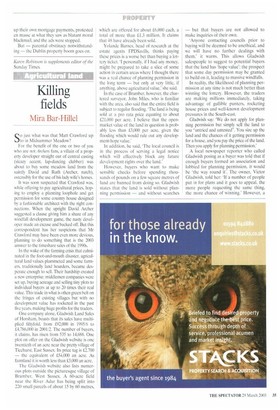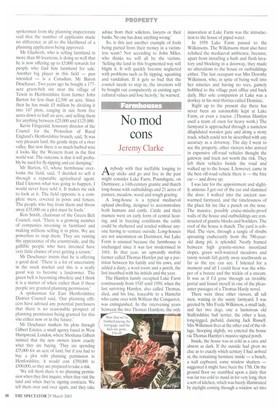Killing fields
Mira Bar-Hillel
CO just what was that Matt Crawford up to in Midsummer Meadow?
For the benefit of the one or two of you who are not Archers fans, a villain of a property developer straight out of central casting (sleazy accent, lap-dancing dubber) was about to buy some meadow land from the saintly David and Ruth (Archer, natch), ostensibly for the use of his lady wife's horses.
It was soon suspected that Crawford was, while offering to pay agricultural prices, hoping to employ a planning loophole and get permission for some country house designed by a fashionable architect with the right connections. When the upright David Archer suggested a clause giving him a share of any windfall development game, the nasty developer made an excuse and backed off. But this correspondent has her suspicions that Mr Crawford may have been even more devious, planning to do something that is the 2003 answer to the timeshare sales of the 1990s.
In the wake of the farming crisis that culminated in the foot-and-mouth disaster, agricultural land values plummeted and some farmers, traditionally land hoarders, became desperate enough to sell. Their hardship created a new enterprise: middlemen companies were set up, buying acreage and selling tiny plots to individual buyers at up to 20 times their real value. This trade in what is often green belt on the fringes of existing villages but with no development value has rocketed in the past five years, making huge profits for the traders.
One company alone, Gladwish Land Sales of Horsham, boasts that its sales have multiplied fiftyfold, from £92,000 in 1995/6 to £4,786,000 in 2001/2. The number of buyers, it claims, has risen from 535 to 14,688. One plot on offer on the Gladwish website is one twentieth of an acre near the pretty village of Ticehurst, East Sussex. Its price tag is £2,700 — the equivalent of £.54,000 an acre. As farmland it is worth less than £3,000 an acre.
The Gladwish website also lists numerous plots outside the picturesque village of Bramber, West Sussex. A 60-acre field near the River Adur has being split into 220 small parcels of about 15 by 60 metres, which are offered for about £6,000 each, a total of more than £1.3 million, It claims that 48 have already been sold.
Yolande Barnes, head of research at the estate agents FPDSavills, thinks paying these prices is a worse bet than buying a lottery ticket. 'I personally, if I had any money, might be prepared to take a slice of some action in certain areas where I thought there was a real chance of planning permission in the long term — but only at very little, if anything, above agricultural value,' she said.
In the case of Bramber, however, the chartered surveyor, John Miles, who is familiar with the area, also said that the entire field is subject to regular flooding. 'The land is being sold at a pro rata price equating to about £21,000 per acre. I believe that the openmarket value of the land in question is probably less than £3,000 per acre, given the flooding which would rule out any development-hope value.'
In addition, he said, 'The local council is in the process of serving a legal notice which will effectively block any future development rights over the land.'
However, buyers who want to make sensible checks before spending thousands of pounds on a few square metres of land are banned from doing so. Gladwish states that the land is sold without planning permission — and without searches — but that buyers are not allowed to make inquiries of their own.
'Anyone contacting councils prior to buying will be deemed to be unethical, and we will have no further dealings with them,' it warns. This allows Gladwish salespeople to suggest to potential buyers that the land has 'hope value': the prospect that some day permission may be granted to build on it, leading to massive windfalls.
In reality, the likelihood of planning permission at any time is not much better than winning the lottery. However, the traders are making millions immediately, taking advantage of gullible punters, rocketing house prices and well-known development pressures in the South-east.
Gladwish say: 'We do not apply for planning permission but simply sell the land to you "untried and untested". You size up the land and the chances of it getting permission for a house, and you pay the price of the land. Then you apply for planning permission,' A local newspaper reporter who called Gladwish posing as a buyer was told that if enough buyers formed an association and lobbied for planning permission, it would be 'the way round it'. The owner, Victor Gladwish, told her: 'If a number of people put in for plans and it goes to appeal, the more people requesting the same thing, the more chance of winning.' However, a spokesman from the planning inspectorate said that the number of applicants made no difference at all to the likelihood of a planning application being approved.
Mr Gladwish. who is selling farmland in more than 80 locations, is doing so well that he is now offering up to £5,000 rewards for people who find him farmland for sale. Another big player in this field — pun intended — is a Canadian, Mr Baron Deschauer. Two years ago he bought a 177acre green-belt site near the village of Tewin in Hertfordshire from farmer John Barton for less than £2,500 an acre. Since then he has made £5 million by dividing it into 147 plots, ranging in size from five acres down to half an acre, and selling them for anything between £25,000 and £.125,000.
Kevin Fitzgerald. honorary director of the Council for the Protection of Rural England's Hertfordshire branch, said, 'It was very pleasant land, the gentle slope of a river valley. But now there is so much barbed wire it looks like the Western front in the first world war. The outcome is that it will probably be used for fly-tipping and car dumping.'
Mr Barton, 63, whose farmhouse overlooks the field, said, 'I decided to sell it through a reputable agricultural agent. Had I known what was going to happen, I would never have sold it. It makes me sick to look at it. The field opposite is a complete mess, covered in posts and fences. The people who buy from them and throw away £35,000 on a plot must be fools.'
Ron Smith, chairman of the Green Belt Council, said, 'There is a growing number of companies investing in farmland and making millions selling it in plots. We are powerless to stop them. They are ruining the appearance of the countryside, and the gullible people who have invested have very little chance of ever getting a return.'
Mr Deschauer insists that he is offering a good deal. 'There is a lot of uncertainty in the stock market and this is a really good way to become a landowner. The green belt is becoming obsolete and I think it is a matter of when rather than if these people are granted planning permission.'
A spokesman for East Hertfordshire District Council said, Our planning officers have advised any potential purchasers that there is no reasonable prospect of planning permission being granted for this site either now or in the future.'
Mr Deschauer markets his plots through Gilbert Estates, a small agency based in West Hampstead, London, where Shoshana Gilbert insisted that the new owners know exactly what they are buying. 'They are spending 1.35,000 for an acre of land, but if you had to buy a plot with planning permission in Hertfordshire, it would cost 050,000 to 1500,000, so they are prepared to take a risk.
'We tell them there is no planning permission when they first inquire, when they visit the land and when they're signing contracts. We tell them over and over again, and they take advice from their solicitors, lawyers or their banks. No one has done anything wrong.'
So, is this just another example of fools being parted from their money in a victimless scam? Not according to John Miles, who thinks we will all be the victims. 'Selling the land in this fragmented way will blight it. It will quickly become neglected with problems such as fly tipping, squatting and vandalism. If it gets so bad that the council needs to step in, the investors will be bought out compulsorily at existing agricultural values and lose heavily,' he warned.









































































 Previous page
Previous page